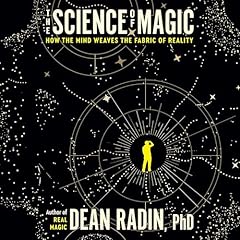
Morphic Resonance
The Nature of Formative Causation
No se pudo agregar al carrito
Solo puedes tener X títulos en el carrito para realizar el pago.
Add to Cart failed.
Por favor prueba de nuevo más tarde
Error al Agregar a Lista de Deseos.
Por favor prueba de nuevo más tarde
Error al eliminar de la lista de deseos.
Por favor prueba de nuevo más tarde
Error al añadir a tu biblioteca
Por favor intenta de nuevo
Error al seguir el podcast
Intenta nuevamente
Error al dejar de seguir el podcast
Intenta nuevamente
Prueba gratis de 30 días de Audible Standard
Selecciona 1 audiolibro al mes de nuestra colección completa de más de 1 millón de títulos.
Es tuyo mientras seas miembro.
Obtén acceso ilimitado a los podcasts con mayor demanda.
Plan Standard se renueva automáticamente por $8.99 al mes después de 30 días. Cancela en cualquier momento.
Compra ahora por $14.99
-
Narrado por:
-
Jez Sands
-
De:
-
Rupert Sheldrake
• Explains how past forms and behaviors of organisms determine those of similar organisms in the present through morphic resonance
• Reveals the nonmaterial connections that allow direct communication across time and space
When A New Science of Life was first published the British journal Nature called it “the best candidate for burning there has been for many years.” The book called into question the prevailing mechanistic theory of life when its author, Rupert Sheldrake, a former research fellow of the Royal Society, proposed that morphogenetic fields are responsible for the characteristic form and organization of systems in biology, chemistry, and physics--and that they have measurable physical effects. Using his theory of morphic resonance, Sheldrake was able to reinterpret the regularities of nature as being more like habits than immutable laws, offering a new understanding of life and consciousness.
In the years since its first publication, Sheldrake has continued his research to demonstrate that the past forms and behavior of organisms influence present organisms through direct immaterial connections across time and space. This can explain why new chemicals become easier to crystallize all over the world the more often their crystals have already formed, and why when laboratory rats have learned how to navigate a maze in one place, rats elsewhere appear to learn it more easily. With more than two decades of new research and data, Rupert Sheldrake makes an even stronger case for the validity of the theory of formative causation that can radically transform how we see our world and our future.
Los oyentes también disfrutaron:




















Las personas que vieron esto también vieron:


















Hard to follow
Se ha producido un error. Vuelve a intentarlo dentro de unos minutos.
A great book mangled by the vocal performance
Se ha producido un error. Vuelve a intentarlo dentro de unos minutos.
Mandatory listening
Se ha producido un error. Vuelve a intentarlo dentro de unos minutos.


